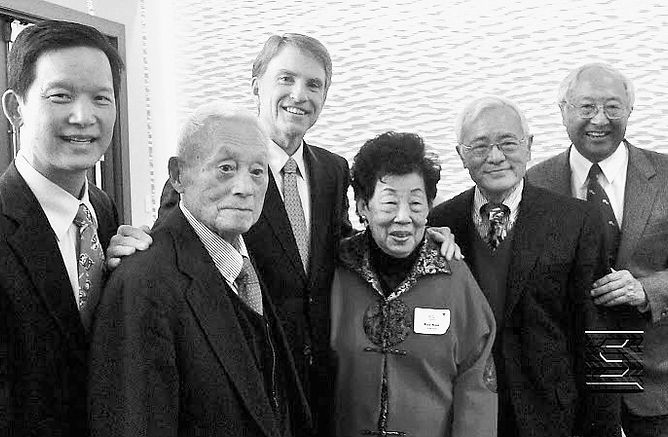The Founders and History of the 1990 Institute
Our Founders
The 1990 Institute was founded in 1990 by C.B. Sung, Dr. Hang-Sheng Cheng, William Lee, and Rosalyn Koo. The founders were all deeply interested in helping the people of China modernize and address its social and economic challenges through productive dialogue, while also avoiding any involvement in the politics of either China or the United States.

C.B. Sung
1990 Institute Co-Founder

Hang-Sheng Chen
1990 Institute Co-Founder

Rosalyn Koo
1990 Institute Co-Founder

William M.S. Lee
1990 Institute Co-Founder
The four founders had the foresight, perseverance, and leadership to establish the 1990 Institute during a period when people-to-people interactions were very much needed to supplement and assist government-to-government discussions. During the early years, the founders galvanized a group of prominent American business, academia, and community leaders. The 1990 Institute had the support of university presidents across the U.S., including Donald Kennedy of Stanford University; Stephen Muller of Johns Hopkins University; Harold Shapiro, President Emeritus of Princeton University; and Chang-Lin Tien of the University of California, Berkeley. Other distinguished advisors included Robert Scalpino, the first chairman of the National Committee for U.S.-China Relations; Philip C. Habib, Under Secretary of State for Political Affairs (under President Reagan), Tung-Yen Lin, renowned structural engineer and bridge builder; Robert Parry, former President and CEO of the Federal Reserve Bank of San Francisco; and Linda Tsao Yang, former U.S. Ambassador and Executive Director to the Board of Directors of the Asian Development Bank.

From left to right: Wei-Tai Kwok, C.B. Sung, Steve Westly, Roz Koo, Hang-Sheng Cheng, Billy Lee
Our History
The 1990 Institute began as an economic and social research think tank aimed at assisting China during a period of modernization. We hosted numerous scholar conferences and joint research projects with the Federal Reserve Bank and other groups. In addition, the 1990 Institute funded Chinese scholars that were in the United States to collaborate with U.S. experts on writing reports and issue papers related to monetary and social reforms. In 1994, our U.S.-China collaborative research report titled China’s Economic Reform was presented to President Jiang Zemin at a large convention. It was well-received and later became a textbook in Stanford University’s economics courses. The 1990 Institute is one of three organizations examined by Norton Wheeler of the Tennessee University at Chattanooga in his book, The Role of American NGOs in China's Modernization: Invited Influence, as having an unconventional approach to U.S.-China relations which yielded positive results in the early years of U.S.-China engagement.
During our second decade, we pivoted our focus to cultural and philanthropic projects in China and collaborated with the All China Women’s Federation (ACWF). Our major programs include the Spring Bud Girls Education Program, where 1,000 girls from poor rural families were given scholarships and all of their expenses for school were covered. The goal was for the participants to continue their schooling and attain the highest level of education they could achieve. Our Pucheng Women’s Sustainable Development Association microfinance program provided funds, governance, structure, and support to this rural microfinance operation and was recognized by the Chinese government as a model microfinance operation. We also partnered with the China National Children’s Center to conduct a number of U.S.-China children’s exchange programs, starting with a Children’s Art and the Environment Contest. Over one million children all over China participated.
During our third decade, as China developed economically and brought hundreds of millions of people into the middle class, we turned our attention to educating young Americans about China. Very little about modern China is taught in secondary schools in the U.S. In 2013, we launched an annual two-day teachers’ professional development program for sixth to twelfth grade teachers called CHINA NOW | Teachers Workshop. In 2020, we partnered with Asia Society Northern California to expand the impact of this workshop. For several years, we also conducted a nationwide video contest called Youth Voices on China, a digital learning initiative that empowered students to learn and create videos on U.S.-China topics. We started a College Essay Contest in 2019 to encourage college students to engage in a deep understanding of modern China.
Now at the end of the 1990 Institute’s third decade, there has been increasing anti-Asian American sentiment in the U.S. caused by adversarial and competitive tensions between the U.S and China. The negative sentiments are further exacerbated by the 2020 Covid-19 pandemic. Against this backdrop, the 1990 Institute will continue its vision to achieve a positive environment for Asian Americans and to create a constructive dialogue in U.S.-China relations. We are initiating innovative programs involving video storytelling, organizing objective and analytical panel discussions, collaborating with advisors and various institutions to curate a library of materials into a reference hub, and employing technology and networking to achieve our mission of broadening understanding and trust and to increase the impact of our programs.